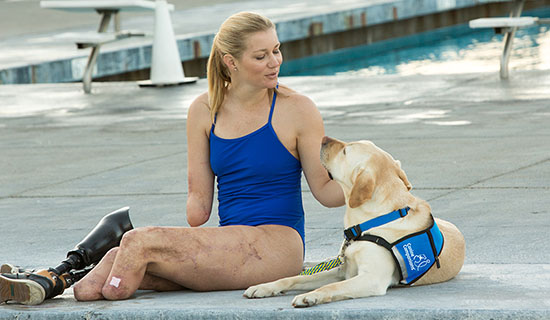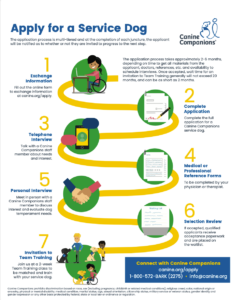
Answer
Canine Companions is a 501(c)(3) non-profit organization that enhances the lives of people with disabilities by providing highly trained service dogs and ongoing support to ensure quality partnerships. We provide our dogs and support services free of charge to recipients.
Answer
Canine Companions trains service dogs and facility dogs:
- Service Dogs – assist adults with physical disabilities or deafness by performing daily tasks or alerting to important sounds.
- Service Dogs for Children – assist children or adults with physical or cognitive disabilities and are handled by an adult facilitator who is responsible for the care and management of the team.
- Facility Dogs – work with a professional in a visitation, education or healthcare setting.
Answer
There is no charge for a Canine Companions service dog. Individual participants in our program are not responsible for any of the substantial costs involved in the lengthy process of breeding, raising, and training each Canine Companions service dog.
Answer
Canine Companions is funded by private contributions from individuals; gifts from businesses, civic groups and service clubs; grants from corporations and foundations; and ongoing fundraising activities, such as special events and mailings. Please visit our donate page for more ways to give.
Canine Companions is also able to do what we do thanks to the support of over 3,000 volunteers nationwide. Our largest group of volunteers are our puppy raisers. Every volunteer puppy raiser contributes to the basic costs of raising a puppy. Learn more about our puppy raising program.
Answer
Canine Companions uses Labrador Retrievers, Golden Retrievers and crosses of these two breeds. Most of our dogs come from Canine Companions selective breeding program. Occasionally, donated puppies are accepted if they meet the strict qualification requirements.
Answer
We do not train dogs from outside of the Canine Companions program to be service dogs. Please check out Assistance Dogs International for other organizations that may be able to assist in evaluating and training a pet dog to become a service dog.
Answer
Canine Companions puppies are raised by volunteers who take them to puppy classes to teach them basic obedience and house manners. When the puppies are old enough to enter our professional training program, Canine Companions dogs come to one of our six regional training centers, located in Northern California, Southern California, Texas, Ohio, New York and Florida.
Answer
The first two years of a dog’s life are spent being trained and socialized before graduating as a service dog. The average service dog then works for eight years. After that time, the dog retires from service and will spend its golden years as a pet.
Answer
Canine Companions typically places between 325 and 375 service dogs per year. We have over 2,700 active teams throughout the country and have placed over 7,700 dogs since our founding in 1975.
Service Dog FAQ
Answer
A Canine Companions service dog can not only open doors, pick up dropped items and turn on the lights and alert to important sounds; they can also increase confidence and independence.
Answer
With the increase in military veterans returning with post-traumatic stress disorder (PTSD), Canine Companions launched a program in 2018 to directly place service dogs with veterans with PTSD. Dogs are trained to identify each veteran’s unique stressors and perform tasks that directly disrupt escalation of symptoms, thus enhancing their quality of life. Tasks may be performed for anxiety, hypervigilance and generalized fear. The dog supports their handler in crowded public situations by creating barriers and distance that might provoke anxiety for individuals with PTSD. Additional tasks such as nightmare interruption, turning on lights and retrieving items are taught to support veterans’ daily lives.
While veterans interested in a service dog for physical or auditory disability are offered at all six Canine Companions training centers, currently the PTSD program is offered in our Northwest, Northeast and South Central Regions. Applicants for the PTSD program must be United States Armed Forces veterans.
Answer
Canine Companions service dogs are highly trained to perform a limited set of practical tasks geared towards assisting individuals with physical disabilities lead more independent lives.
Some of the tasks they are trained to do:
- Retrieve and deliver dropped items
- Tug to open a door or drawer
- Pull a laundry basket, or help with a sock or jacket
- Push with their nose to shut a drawer
- Open a door with an automatic push plate
- Pull a lightweight manual wheelchair over a short distance
- Turn lights on and off
- Our service dogs for deafness have a different skill set, primarily involving alerting and orienting recipients to sounds
Answer
Although our graduates find an incredible depth of emotion in the bond between them and their dog beyond just the working tasks, Canine Companions does not place dogs with individuals for the primary benefit of emotional comfort or social support.
In addition, Canine Companions dogs are not trained to do the following:
- Guide work for the blind
- Seizure or diabetic alert/response
- Balance or stability work
- To recognize and/or manage undesirable human behavior or provide supervision, navigation, or safety from environmental hazards
- Respond aggressively or provide personal protection
- Assist with the management of mental illness as a primary condition, with the exception of veterans living with PTSD.
Application Process
Answer
People with physical or developmental disabilities, adults who are Deaf or hard of hearing, as well as professionals working in health care, visitation, educational or criminal justice settings who can demonstrate that a service dog will enhance their independence or their quality of life are qualified to apply.
Click here to learn more about whether an service dog is right for you.
Answer
The application process, as well as all lectures, individual instruction and written class materials for the pairing process (Team Training), are given in English. We can accommodate specific communication needs, including providing interpreters for our deaf or hard-of-hearing students during Team Training and other events.
Answer
Individuals applying for a service dog must be at least 18 years old with an established, stable home life. We find those 25 years of age and up typically are most suitable for a service dog. Children must be at least 5 years old to be considered for a skilled companion.
Answer
Canine Companions has a comprehensive and interactive application process. Before we begin, we first exchange basic information to determine whether the program will be a good fit. At each step of the application process, experienced Canine Companions staff review an applicant’s need and qualifications to determine whether or not the applicant will move on. Click on the graphic below for more information about the application process.
Answer
All inquiring individuals should receive a response from Canine Companions within 2-4 weeks. Due to a high volume of applications, there is a chance that it may take longer than normally anticipated. We appreciate your patience as we review our applications. Please visit our FAQ page to view other commonly asked questions.
Answer
Once on the list, the wait time varies greatly between categories and based on each individual’s needs. Typically, service dog candidates have the longest wait, as dogs with very specific temperaments are needed for these placements.
Training Canine Companions Service Dogs
Answer
Each Canine Companions dog spends the first year-and-a-half with a volunteer puppy raiser, learning basic commands and socializing in public and private settings. Once the puppy raiser returns the puppy to Canine Companions, it enters professional training at a regional training center for six to nine months, where it will go through professional training and learn advanced commands that will support the work of a service dog.
Answer
It takes an exceptional dog to graduate as a service dog, and not every dog is suitable. All dogs must be highly proficient in the trained skills and tasks. In addition, Canine Companions dogs receive rigorous medical and temperamental screening to ensure that every dog that graduates will be healthy, happy and appropriate in their role.
Answer
Approximately two years old.
Canine Companions is committed to finding the perfect placement for every dog, no matter what that placement might be. If a dog is deemed behaviorally or medically inappropriate for our program, we will first evaluate if the dog is suitable for transfer to another agency, such as another service dog organization, drug detection or search and rescue. If agency transfers are not a good fit for the dog, the dog will be released and made available for adoption as a family pet. Click here for more information on released dog adoption.
Matching and Beyond
Answer
Once a dog has completed professional training, it is ready to be matched with a person with a disability. The team is matched at one of our regional training centers during Team Training, a two-week group class. During Team Training, students learn to manage the service dog’s behavior; to direct the dog to respond to commands it has learned; and to assume responsibility for maintaining the health and well-being of the dog.
Answer
Canine Companions has a comprehensive and participatory program to ensure the ongoing success of its working teams. Throughout the working life of the dogs, graduates periodically return to campus with their dogs for public certification, workshops, seminars and reunions.
In addition, Canine Companions instructors and graduates communicate on an on-going basis through correspondence, reports and by providing advice via phone and email. Instructors also travel into the field to conduct workshops and to resolve specific training or behavioral problems in the graduate’s home and/or workplace environment.
Canine Companions maintains ownership of the service dog even after placement is made. A graduate is personally and financially responsible for the service dog’s care and maintenance, including food and veterinary expenses.


